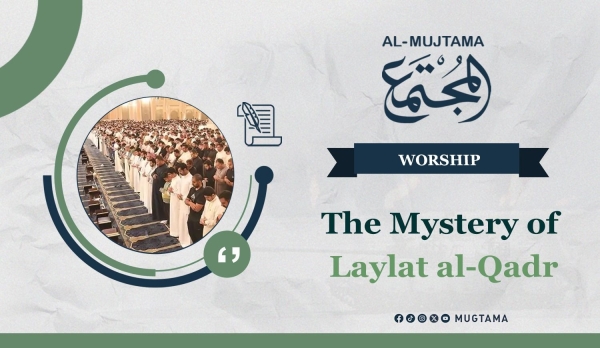Allah, the Most High, has concealed many things from His servants despite their eagerness to know them. He has hidden His Greatest Name among His Beautiful Names—the Name by which if He is asked, He grants, and if He is invoked, He responds—so that people would call upon Him using all of His Beautiful Names. Similarly, He has concealed the Hour of Du’a Response on Friday so that people would strive in supplication throughout the entire day. Likewise, He has hidden the Night of Decree (Laylat al-Qadr) within the last ten nights of Ramadan for great wisdom and noble purposes, including:
1- Continuity in Worship Seeking Its Blessings
Allah, the Most High, has clarified the immense status of Laylat al-Qadr, saying: “The Night of Decree is better than a thousand months. The angels and the Spirit descend therein by permission of their Lord for every matter.” (Al-Qadr: 3-4) The Prophet ﷺ emphasized that seizing the opportunity of Laylat al-Qadr leads to the forgiveness of sins. In Sahih al-Bukhari, Abu Huraira (may Allah be pleased with him) reported that the Prophet ﷺ said: “Whoever established prayers on the night of Qadr out of sincere faith and hoping for a reward from Allah, then all his previous sins will be forgiven.” There is nothing greater for a believer than attaining Allah’s forgiveness; therefore, he seeks it and remains keen on it by striving in worship on this blessed night. If its exact time were known, a person would only strive on that particular night. However, since its timing is hidden, he strives throughout the last ten nights of Ramadan. The Prophet ﷺ instructed his followers to search for it in these nights. In Sahih al-Bukhari, Ibn Abbas (may Allah be pleased with them) narrated that the Prophet ﷺ said: “Seek Laylat al-Qadr in the last ten nights of Ramadan, on the twenty-first, twenty-third and twenty-fifth.”
2- Increased Supplication
Laylat al-Qadr is filled with mercy, forgiveness, and blessings. The Prophet ﷺ would frequently supplicate during it and encouraged believers to do so. In Musnad Ahmad, Abdullah ibn Buraidah (may Allah be pleased with him) narrated that Aisha (may Allah be pleased with her) said: “O Messenger of Allah, what do you think I should say in my supplication, if I come upon Laylatul-Qadr?” He said: “Say: 'Allahumma innaka 'afuwwun tuhibbul-'afwa, fa'fu 'anni (O Allah, You are Forgiving and love forgiveness, so forgive me).'”
This guidance encourages people to strive in seeking Allah’s pardon, which is the best thing a person can ask for. Whoever is pardoned by Allah is granted entry into His Paradise. Due to the great importance of seeking forgiveness, Allah, the Almighty, has concealed Laylat al-Qadr so that supplication may be abundant and continuous throughout all the nights.
3- Avoiding Disputes
Al-Bukhari reported in his Sahih that Ubadah ibn al-Samit (may Allah be pleased with him) that the Prophet came out to inform them about Laylat al-Qadr, but finding two Muslims disputing together he said, “I came out to inform you about Laylat al-Qadr, but so and so and so and so had a dispute, and the knowledge of it has been withdrawn. That, however, may perhaps be better for you, so seek it on the ninth, the seventh and the fifth.”
The term “disputing” here refers to arguing and raising voices, leading to discord and estrangement among people. This hadith indicates that disputing caused the knowledge of the exact date of Laylat al-Qadr to be forgotten. Since disputes prevent goodness from reaching people, concealing Laylat al-Qadr encourages believers to avoid conflicts, ensuring they do not miss out on its immense rewards.
4- Abstaining from Sin
There is great mercy behind hiding this night. Since Laylat al-Qadr carries immense rewards, if a person were to sin knowingly on such a sacred night, his sin would be greatly multiplied. Imam al-Razi mentioned in his Tafsir: “It is as if Allah is saying: If I had specified Laylat al-Qadr while knowing of your inclination to sin, then perhaps your desires would have led you to commit a sin on that night. If that happened, then your sin, while knowing the virtue of the night, would be graver than if you had sinned unknowingly. For this reason, I have concealed it from you. It is as if Allah is saying: If you knew when exactly is Laylat al-Qadr, then if you obeyed, you would earn the reward of a thousand months, but if you sinned, you would bear the punishment of a thousand months. Preventing punishment is more important than bringing reward.”
5- Increasing Goodness and Competition in Worship
Since Laylat al-Qadr is filled with divine blessings, people compete to attain these blessings by performing various good deeds. Some pray two extra rak’ahs, others pray third of the night, some pray for half the night, and others pray the whole night. Some seek its rewards by forgiving others and reconciling disputes, while others strive for its blessings by giving charity, feeding the needy, and serving others, and the good deeds are abundant.
If the exact date of Laylat al-Qadr were known, the period of such acts of devotion would be limited. However, its concealment expands the duration of worship, encouraging diversity and competition in good deeds. This increases Muslims’ eagerness to engage in worship and compete in acts of righteousness, deepening the spiritual impact of Ramadan in their lives.
Laylat-al-Qadr… The Night of a lifetime! | Sheikh Yusuf al-Qaradawi
-------------------------------------------------------------


